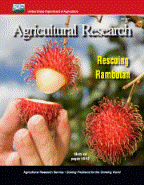United States Department of Agriculture: Agricultural Research Service, Lincoln, Nebraska

Agricultural Research Magazine
Date of this Version
5-2013
Document Type
Article
Citation
Agricultural Research May/June 2013.
Abstract
Each year, more than a half-million infants are born prematurely in the United States. Many of these preemies, particularly those whose tiny digestive systems are simply too underdeveloped to handle mother’s milk or infant formula, may need to be nourished exclusively via intravenous feeding, known as “total parenteral nutrition,” or TPN.
TPN solutions, usually administered at the hospital for anywhere from a few days to a month or more, provide essential nutrients broken down into a very basic form. This liquid is gently and continuously infused into the infant’s bloodstream, completely bypassing the digestive tract.
“TPN helps save the lives of newborns and supports their growth and development, especially of the brain,” says Douglas G. Burrin, an Agricultural Research Service physiologist at the Children’s Nutrition Research Center in Houston, Texas, and a faculty member at Baylor College of Medicine, also in Houston.
But preemies who are on TPN for longer than 2 weeks may develop complications that might affect their health later in life. Since 1998, Burrin and colleague Barbara Stoll, who is also with the nutrition center and the college faculty, have worked with teams of scientists in the United States and abroad to discover more about the unwanted side effects of TPN and to develop new, safe, effective ways to prevent these unintended consequences or, at the very least, to minimize their impact.
Included in
Agriculture Commons, Animal Sciences Commons, Food Science Commons, Plant Sciences Commons

